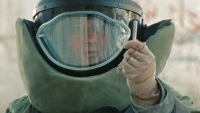Randy Schlenker, owner of Aubry’s Automotive in Longmont, has the secret to longevity. He sits on a stool behind the counter of his shop where the railroad tracks cross 9th. The place is an authentic mechanic’s lair: short on janitorial service, long on evidence of real work. The row of repair manuals behind Randy, once phone book yellow, are grubby brown from actual use by actual mechanics. Randy’s goatee is white, his face largely wrinkle-free, his frame generously encumbered. Tomorrow his grandparents celebrate their 70th wedding anniversary.
Randy says his grandparents still smoke close to three packs of cigarettes a day. Grandpa has one Bud, sometimes two, every day at exactly one o’clock. No matter where he is, 1:00 is Budweiser time. Grandma joins him with a vodka and Sprite. Sometimes two or three over the afternoon, but rarely more than that.
They were farmers. Before that, after his schooling, Grandpa was a jockey and broke horses. Back then he was as short as he is now, but ripped: he looked like he could break horses (over his knee). Grandma in her 30s was a house mother for a fraternity in Boulder. Randy saw a photo of her and Grandpa in Hawaiian shirts and leis, “chaperoning” a party. They both looked bombed. Randy asked if they were as blitzed as they looked. Grandpa answered: “Yup. Them college kids kin drink!”
Grandpa ate butter, bacon grease, and lard his whole life like it was going out of style. He smoked and drank the way he does now (or more) his whole life. Same for grandma. When they preside over tomorrow’s festivities, they’ll be fit as fiddles. They are among the last seven survivors of their class from the original Longmont High when it was at 9th and Main. Those classmates will be there tomorrow, along with some of the old fraternity boys— now doctors and such— flying in to see this venerable, beloved couple.
Grandma once gave Randy advice that he remembers to this day. It was when he married her daughter: “Always try to avoid going to bed angry.” It can be tough, she said, and nobody’s saying you can’t slip now and then— but if you make an effort to not hit the pillow mad, it’s always worth it.
His grandparents always had a good time. It wasn’t about the outrageous drinking, but about people coming together for fun. Music, dancing, lively conversation— those are their keys to longevity.
But what about their eating and drinking habits? Doth the fountain of youth runneth over with Budweiser and lard? Randy says he discussed this with his doctor. The doctor asked him if he worked like a farmer. Randy said he worked hard, but not like toiling in the fields for 8-12 hours a day. The doctor said: “Then you can’t eat like a farmer.” It takes a lot of effort to turn bacon grease to fuel. Sitting at a desk doesn’t git-r-done. So us desk jockeys probably can’t do that much smoking, drinking, and eating of heavy farmer fuel without ill effects.
There’s simple takeaway here: eat that heart attack burger and deep fried slab of whatever. Smoke that cigarette and drink that lunchtime beer. And then go plow the field all day. I’ll see you for dinner.
Thanks for reading. Cheers,
![]()
Photo by Gianni D.
 What if there was a little bit of right in every thoughtful, caring person the world ever knew? What if very, very few people (if any) were utterly worthless and the rest of us had something to contribute? Then it would be a matter of each of us, in our own way, figuring out what that contribution was, then honing it.
What if there was a little bit of right in every thoughtful, caring person the world ever knew? What if very, very few people (if any) were utterly worthless and the rest of us had something to contribute? Then it would be a matter of each of us, in our own way, figuring out what that contribution was, then honing it.